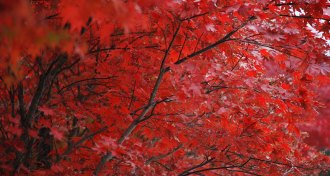Feature
-
 Astronomy
AstronomyJet Astronomy
For the first time, scientists have traced the slowing and dimming of X-ray-emitting jets from a black hole.
By Ron Cowen -
 Health & Medicine
Health & MedicineOld Drug, New Uses?
A hormone called erythropoietin, long used to treat anemia, also seems to protect against nerve damage and holds promise as a new therapy for stroke and spinal cord injury.
-
 Earth
EarthHunting Prehistoric Hurricanes
Storm-tossed sand offers a record of ancient cyclones.
By John Travis -

Red Snow, Green Snow
It's truly spring when those last white drifts go technicolor as algae bloom in the snow.
By Susan Milius -
 Earth
EarthOnce Upon a Lake
As Earth warmed at the end of the last ice age, the immense volumes of fresh water that occasionally and catastrophically spilled from Lake Agassiz—the long-defunct lake that formed as the ice sheet smothering Canada melted—may have caused global climate change and sudden rises in sea level.
By Sid Perkins -
 Math
MathElection Selection
By ignoring how voters might rank all the candidates in an election, the plurality system opens the floodgates to unsettling, paradoxical results when there are three or more candidates.
-

-
 Agriculture
AgricultureDowntown Fisheries?
Advances may make fish farming a healthy prospect, even for inner cities.
By Janet Raloff -
 Plants
PlantsWhy Turn Red?
Why leaves turn red is a stranger question than why they turn yellow.
By Susan Milius -
 Physics
PhysicsThe Physics of Fizz
Toasting a burst of discovery about bubbles in champagne and beer.
By Peter Weiss -
 Math
MathPrime Pursuit
A novel approach for identifying prime numbers provides a long-sought improvement in the theoretical efficiency of prime-detecting algorithms.
-
 Math
MathChanges of Mathematical State
Untangling a web of conflicting demands can be tough on computers.